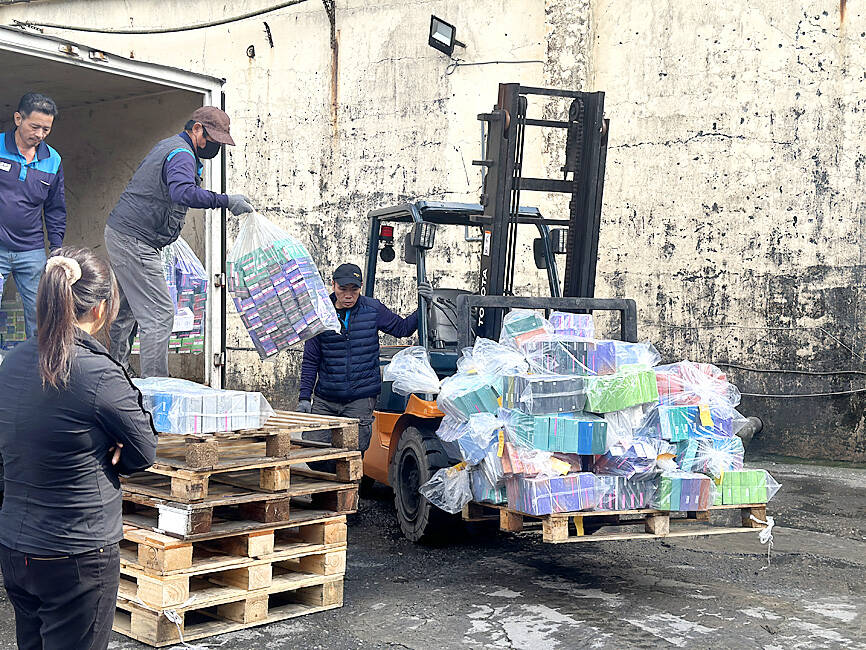The Clean Air Alliance yesterday called on the public to join a protest in front of the Presidential Office Building in Taipei today against tobacco regulations that benefit cigarette manufacturers.
Police said traffic restrictions would be in place in the area.
Heated tobacco products might help reduce secondhand smoke, but they still cannot be sold legally, despite it being a full year since the Tobacco Hazards Prevention Act (菸害防制法) was amended, while 14 new types of traditional paper-wrapped cigarettes have been approved for sale, the alliance said.

Photo courtesy of the New Taipei City Department of Health
The review standards for heated and traditional cigarettes were disparate and unfair toward heated tobacco products, benefiting cigarette manufacturers, it said.
Police said that organizers had submitted a schedule showing that they are to gather at 9am, set out at 10am and finish at noon.
Traffic restrictions for Ketegalan Boulevard are to include three westbound lanes, including Zhongshan S Road to Gongyuan Road, police said.
Restrictions might be in place before the start time, depending on traffic conditions, they said.
Separately yesterday, the Taiwan Anti-smoking Alliance said that the government should step up efforts to curb online sales of electronic cigarettes and focus on stopping imports at source.
The government should curb cigarettes in schools to achieve its total ban on smoking on campuses, the group said.
A rule requiring that warning labels cover 50 percent of cigarette packaging, which took effect today, is an improvement, but more work is needed, as Taiwan only ranks 16th in the world in terms of warning label coverage, down from fourth previously, it said.
National Alliance of Presidents of Parents’ Associations deputy director-general Chiao Hui-fang (焦惠芳) said that regulations for heated tobacco products fail to ban the 10 most popular flavors, showing that the rules do not meet global standards.
Common Good Association secretary-general Chang Wen-chang (張文昌) said that few venues have complied with the amended act’s demand that restaurants, bars and nightclubs ban smoking entirely.
The government must reinforce the policy, Chang said.
Taiwan Medical Alliance for the Control of Tobacco secretary-general Kuo Fei-jan (郭斐然) said there is evidence that transitioning from traditional to heated products does not mitigate health risks.
Action Alliance on Basic Education chairman Wang Han-yang (王瀚陽) said that heated tobacco products are not authorized in Taiwan and urged the government to increase penalties for distributors that promote such products.

Chinese Nationalist Party (KMT) Chairman Eric Chu (朱立倫), spokeswoman Yang Chih-yu (楊智伃) and Legislator Hsieh Lung-chieh (謝龍介) would be summoned by police for questioning for leading an illegal assembly on Thursday evening last week, Minister of the Interior Liu Shyh-fang (劉世芳) said today. The three KMT officials led an assembly outside the Taipei City Prosecutors’ Office, a restricted area where public assembly is not allowed, protesting the questioning of several KMT staff and searches of KMT headquarters and offices in a recall petition forgery case. Chu, Yang and Hsieh are all suspected of contravening the Assembly and Parade Act (集會遊行法) by holding

PRAISE: Japanese visitor Takashi Kubota said the Taiwanese temple architecture images showcased in the AI Art Gallery were the most impressive displays he saw Taiwan does not have an official pavilion at the World Expo in Osaka, Japan, because of its diplomatic predicament, but the government-backed Tech World pavilion is drawing interest with its unique recreations of works by Taiwanese artists. The pavilion features an artificial intelligence (AI)-based art gallery showcasing works of famous Taiwanese artists from the Japanese colonial period using innovative technologies. Among its main simulated displays are Eastern gouache paintings by Chen Chin (陳進), Lin Yu-shan (林玉山) and Kuo Hsueh-hu (郭雪湖), who were the three young Taiwanese painters selected for the East Asian Painting exhibition in 1927. Gouache is a water-based

Taiwan would welcome the return of Honduras as a diplomatic ally if its next president decides to make such a move, Minister of Foreign Affairs Lin Chia-lung (林佳龍) said yesterday. “Of course, we would welcome Honduras if they want to restore diplomatic ties with Taiwan after their elections,” Lin said at a meeting of the legislature’s Foreign Affairs and National Defense Committee, when asked to comment on statements made by two of the three Honduran presidential candidates during the presidential campaign in the Central American country. Taiwan is paying close attention to the region as a whole in the wake of a

OFF-TARGET: More than 30,000 participants were expected to take part in the Games next month, but only 6,550 foreign and 19,400 Taiwanese athletes have registered Taipei city councilors yesterday blasted the organizers of next month’s World Masters Games over sudden timetable and venue changes, which they said have caused thousands of participants to back out of the international sporting event, among other organizational issues. They also cited visa delays and political interference by China as reasons many foreign athletes are requesting refunds for the event, to be held from May 17 to 30. Jointly organized by the Taipei and New Taipei City governments, the games have been rocked by numerous controversies since preparations began in 2020. Taipei City Councilor Lin Yen-feng (林延鳳) said yesterday that new measures by